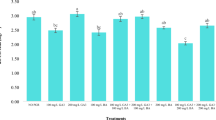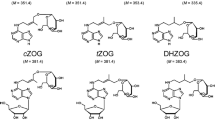Abstract
IN his review of 1965, Paleg1 outlined the many biological tests that have been used as quantitative assays for gibberellins. The lettuce hypocotyl test is perhaps the simplest to carry out, but the lowest concentration that can be reliably assayed is only 0.1 mg/1. The most sensitive assay is the barley endosperm test which detects concentrations as low as 0.0001 mg/1., but this method has the disadvantage that the procedure is both involved and laborious.
This is a preview of subscription content, access via your institution
Access options
Subscribe to this journal
Receive 51 print issues and online access
$199.00 per year
only $3.90 per issue
Buy this article
- Purchase on Springer Link
- Instant access to full article PDF
Prices may be subject to local taxes which are calculated during checkout
Similar content being viewed by others
References
Paleg, L. G., Ann. Rev. Plant Physiol., 16, 291 (1965).
Osborne, D. J., and McCalla, D. R., Plant Physiol., 36, 219 (1961).
Fletcher, R. A., and Osborne, D. J., Nature, 207, 1176 (1965).
Fletcher, R. A., and Osborne, D. J., Canad. J. Bot., 44, 739 (1966).
Author information
Authors and Affiliations
Rights and permissions
About this article
Cite this article
FLETCHER, R., OSBORNE, D. A Simple Bioassay for Gibberellic Acid. Nature 211, 743–744 (1966). https://doi.org/10.1038/211743a0
Issue Date:
DOI: https://doi.org/10.1038/211743a0
This article is cited by
-
Biological assays for gibberellins
The Botanical Review (1971)
-
Senescence Retardation in Dock Leaves by Soluble Peptone
Nature (1969)
-
Endogenous gibberellin levels and senescence in Taraxacum officinale
Planta (1969)
-
Interaction of Growth Regulators in the Senescence of Nasturtium Leaf Disks
Nature (1967)
Comments
By submitting a comment you agree to abide by our Terms and Community Guidelines. If you find something abusive or that does not comply with our terms or guidelines please flag it as inappropriate.



